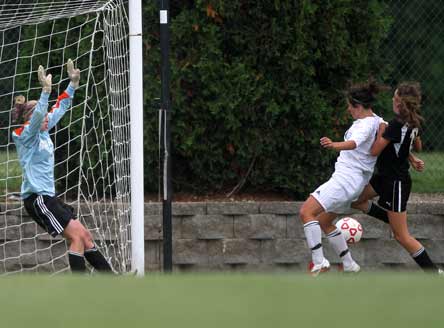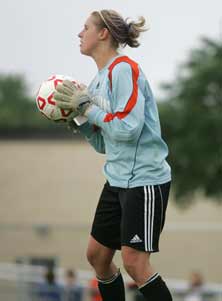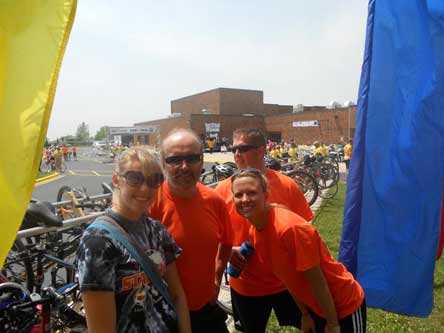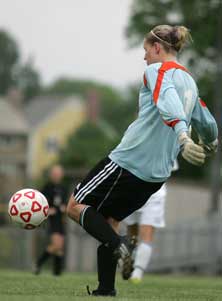Goalkeeper for one of Wisconsin's best programs has learned to stay cognizant of her Type-1 diabetes.

Alissa Viste, left, has to stay aware of scoring threats on the soccer field. Off the field, she has to stay aware of complications from Type-1 diabetes. Nearly one in 400 children in America have Type-1 diabetes.
Photo by Allen Fredrickson
can't let her guard down. She must always be cognizant of her surroundings and stay keenly aware of how she's feeling. If she doesn't, bad things are sure to happen.
It's a fact of life that doesn't just apply to her role as the goalkeeper for one of Wisconsin's top girls soccer teams. It's a fact of life that Viste deals with every day as someone with Type-1 diabetes.
One in every 400 children in America have Type-1 diabetes, according to the American Diabetes Association, and Viste is one of 25.8 million people with the condition. Though balancing the condition with the rigors of being a standout goalkeeper is significant and admirable, it falls a bit short of being called heroic or beating all the odds. And that's a point Viste makes sure to make — that people with diabetes do not have a disease that prevents a normal life and stunts dreams of athletic success.
"You have a disease and you have to take care of yourself, but you can live normally and do what you want. You just have to be a little more careful," she said.

Alissa Viste led Grafton to withinone win of the state final inWisconsin this season.
Photo by Allen Fredrickson
It doesn't take herculean efforts to play sports for those with diabetes. And contrary to what some think, diabetes shouldn't keep kids from playing sports. Doctors W. Guyton Hornsby, Jr., and Robert D. Chetlin state in their article "Management of Competitive Athletes With Diabetes" that exercise is an important tool for most patients.
It doesn't take herculean efforts — but it does require persistent monitoring.
Viste, 17, said she checks her blood sugar numbers about five times per day. On game days, she makes sure to check just before the beginning of the game and once again at halftime. She can't eat whatever she wants whenever she wants, so she has to watch the things she eats and how they affect her blood sugar. Before games she eats proteins to keep her blood sugar high — but not too high.
"When I am on the higher range I don't tend to play my best, I tend to be sluggish and lazy," Viste said, detailing the delicate balance between high and too high. "I've had to push through that a lot of times."
She seemed to push through quite well this year as a junior. Her
Grafton (Wis.) team made it to the Wisconsin Interscholastic Athletic Association Division 1 semifinals Friday before losing to West (Waukesha, Wis.) 4-2 in penalty kicks after a scoreless tie. Grafton finished its season at 24-3-3 with Viste in net. She was an All-North Shore Conference Team pick last year as a sophomore, leading Grafton to the state title game in Division 2.
Viste wears an OmniPod, a device that she fills with insulin at home and then sticks to her skin. The device pricks her with a short needle and begins delivering the flow of however much she needs. A wireless pod, sort of like an iPod, reads and monitors her blood sugar. Another wireless device, called a Continuous Glucose Monitor, can alert her parents and show trends, though she doesn't wear the CGM while she plays.
She's had five hypoglycemic seizures before, so when numbers aren't right, there are grave consequences.
It's second nature for her mother and father to ask her "How are your numbers" and to check on her while she's sleeping. Mike Viste said "We seldom get a good night's sleep straight through. We’re in the habit of being concerned."
Mike knows there is no cure for diabetes and that he isn't the man who is going to discover that cure. He decided he was going to do what he could to help, and that came in the form of riding a bike.
Continue reading{PAGEBREAK}

From left to right after the Tour de Cure bike ride in Grafton: Alissa Viste, Mike Viste, Kasie Viste and Justin Viste.
Photo by Rene Viste
Mike raised funds for diabetes research in the Tour de Cure program and with a team called the "Vistenators" rode 50 km Saturday, the day of the state soccer championships in Wisconsin. He knows he can't do anything to fix his daughter's condition, but he said he knew he could make the future brighter for all who have diabetes or those who may be diagnosed with it in the future.
"I could do certain things daily for her, but what about the long-term problem? The only way to address that part was to raise funds for research," Mike said, adding that his Saturday schedule would have been brutal had Grafton made the title match. "It turned out to be heartwarming in some ways because when I asked people to sponsor me, there was such a good response. I got more guys to ride with me and they raised funds too."

Alissa Viste found out she hadType-1 diabetes in the sixthgrade.
Photo by Allen Fredrickson
Diabetes doesn't make itself apparent at birth. Alissa said it wasn't until sixth grade that she felt sick and out of energy, requiring some medical help. Trips to the doctor ensued and when the diagnosis came, her parents weren't sure how it was going to affect their lives.
“I was relieved. I thought it was something more serious. My grandfather and grandmother on both sides later in life dealt with some form of Type-2 diabetes so I wasn't freaked out," Mike said. "Then all the sudden this whole journey started and I had no idea what was in front of me."
And he had no idea if his daughter was going to be able to play sports.
"It wasn't 'Oh my God, she is done.' It was all a big guess. And with encouragement from Children's Hospital we decided to press on," he said.
Pressing on has enabled Alissa to keep playing the game she loves. It's not obvious to other players that she has diabetes, and the only time she's met soccer players with the condition is at camps for diabetic kids. Most importantly, Alissa said, it's not a social issue. She's treated just like any other player.
Her mother, Rene Viste, said it can be stressful making sure that Alissa is taking care of herself. A lot of help has come from coach Don Arnold, who not only helps Alissa monitor her condition but also rode in the Tour de Cure event with Mike Viste.
"It's always on my mind and it's on her mind too, but she's getting to an age where she's trying to be more responsible. I'm overly protective and I'm more on the nervous side, so I let my husband take care of it a little bit more," Rene said.
And Mike doesn't take care of watching over Alissa on his own. It takes a cooperation between parents, coaches, friends and even community members to make sure Alissa stays healthy. The town of Grafton, about a 25-minute drive north of Milwaukee, has 11,470 residents.
"Though she has incredible internal strength she also gets a lot of strength from friends and teammates and coaches and family," he said. "If it was just our family, that’s one thing, but with everyone else, she has a big support network. And I think that's awesome."
With the staggering numbers of children being diagnosed with diabetes, there are also going to be staggering numbers of parents with no idea what comes next after the diagnosis. Mike Viste doesn't have all the answers, but he knows that just like goalies do, parents of diabetic children need to stay aware and be ready for anything.
“I would say, No. 1, remain calm because if you're not they sense it and that makes their situation worse. Stay positive, be prepared to exert more energy to make this thing happen and keep a positive outlook. (Diabetes) is not going to stop anybody if they pay attention to their body and people help. The medical industry is advancing all the time and it’s all manageable. But your life will be quite different."